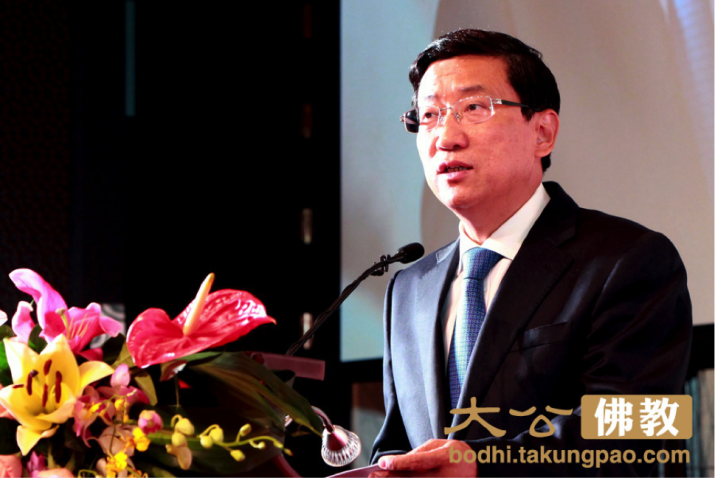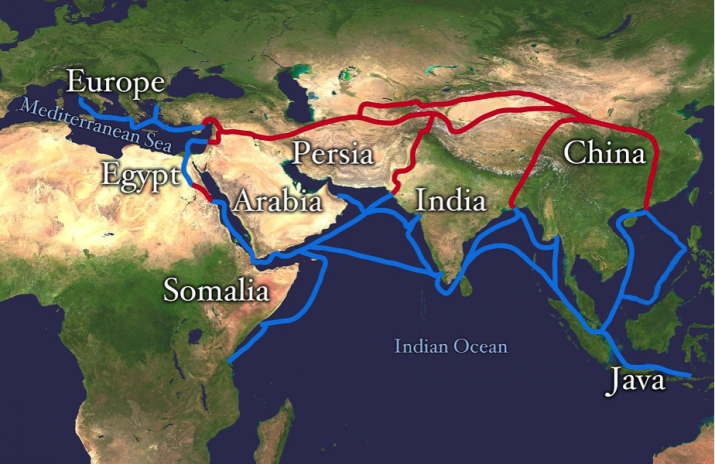NEWS
Guangdong Seeks to Boost Regional Buddhist Exchange under Maritime Silk Road Plan
 Jiang Jianyong, deputy head of the State Administration for Religious Affairs, made a keynote speech at the symposium. From bodhi.takungpao.com
Jiang Jianyong, deputy head of the State Administration for Religious Affairs, made a keynote speech at the symposium. From bodhi.takungpao.comGuangdong Province in southeast China is hoping to increase Buddhist exchange in the region under the country’s 21st Century Maritime Silk Road plan and continue the legacy of the ancient Silk Roads.
Speaking at the “Chinese Buddhism and Maritime Silk Road Symposium” held in Zhuhai on 16 and 17 November, Deputy Head of the State Administration for Religious Affairs Jiang Jianyong envisaged Guangdong as a major gateway in promoting Buddhism internationally, benefited by its strategic geographical and cultural location.
Organized by the Chinese Institute of Buddhist Cultural Studies, Guangdong Provincial Buddhist Association, and Zhuhai City Buddhist Association, the symposium was held at Zhuhai’s Putuo Temple in conjunction with the celebration of the temple’s 15th anniversary and a series of events themed around the Maritime Silk Road. Six cultural events were held over the two days, including a painting and calligraphy exhibition, a photography contest, and a concert honoring the Sixth Patriarch of Chan Buddhism, Huineng. Over 600 participants attended the events.
Venerable Shi Mingsheng, chairperson of the Guangdong Provincial Buddhist Association, told the Nanfang Daily that Buddhist groups in Guangdong, and especially Guangzhou, had already launched a series of tours to countries along the Maritime Silk Road. So far, groups have visited Singapore, Malaysia, Thailand, and Indonesia, and plans are under way to visit heritage sites in India, Nepal, and Sri Lanka as well as to support charity projects in neighboring countries. At the symposium, representatives from the Guangdong Buddhist community presented a RMB1 million check to a representative from Sri Lanka’s Buddhist community. Putuo Temple is also looking to fund the renovation of 100 temples in Sri Lanka.
“The Silk Roads played an important role in human civilization. They are more than ancient trade routes, but also passages that enabled religious and cultural exchange,” said Venerable Shi.
Predating the Han dynasty (206 BCE–220 CE), the ancient Silk Roads comprised a network of routes that connected China to Europe as well as to Southeast Asia and India. They were used to trade and transport a vast array of products, such as silk and spices, across Eurasia, and reached a peak during the Tang dynasty (618–907). Alongside the movement of goods, merchants and travelers spread culture, ideas, and knowledge—such as silk and paper production—to foreign countries.
 Map of the ancient trade routes that are today known as the Silk Roads. From wikipedia.org
Map of the ancient trade routes that are today known as the Silk Roads. From wikipedia.orgArguably the starting point of the ancient Maritime Silk Road, Guangdong was one of its most important trading ports. Numerous monks and scholars from India and Sri Lanka entered China through the province, including Paramartha and Gunabhadra, who translated Buddhist texts into Chinese and thus helped disseminate Buddhism to China, according to Yang Zengwen of the Chinese Academy of Social Sciences. “The Guangdong region was more than a port on the Maritime Silk Road. It was also the southern gate for Buddhism to spread into China,” he said.
Inspired by the historical Silk Road, the 21st Century Maritime Silk Road—part of China’s One Belt, One Road initiative—was first proposed by Chinese President Xi Jinping during his visit to Indonesia in October 2013, in the hope of strengthening economic and diplomatic ties with ASEAN countries. Details of the initiative were officially released in March this year.
Guangdong is not alone in promoting the country’s ambitious strategy: at the Ninth National Conference of the Buddhist Association of China in April this year, director of the State Administration for Religious Affairs Wang Zuo’an called for temples and Buddhist groups across China to follow the direction of the One Belt, One Road policy and foster regional Buddhist exchanges. As a response to Wang’s call, Hainan Province has sketched out a plan to construct a facility for Buddhist Studies, the Nanhai Buddhist Research Center, according to Chinese state media People’s Daily.
See more
New Silk Road boosting Buddhist exchanges: official (Xinhua News Agency)
中國佛教與海上絲綢之路系列活動 譜寫佛教文化交流新篇章 (大公報)
中国佛教与海上丝绸之路系列活动在珠海启动 (鳳凰網)














